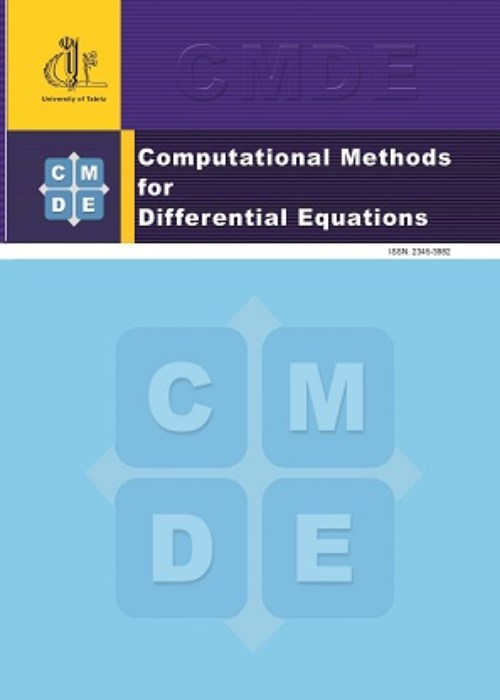فهرست مطالب
Computational Methods for Differential Equations
Volume:3 Issue: 2, Spring 2015
- تاریخ انتشار: 1394/01/12
- تعداد عناوین: 6
-
-
Pages 70-86In this paper, we obtain exact solutions involving parameters of some nonlinear PDEs in mathmatical physics; namely the one-dimensional modified complex Ginzburg-Landau equation by using the $ (G'/G) $ expansion method, homogeneous balance method, extended F-expansion method. By using homogeneous balance principle and the extended F-expansion, more periodic wave solutions expressed by jacobi elliptic functions for the 1D MCGL equation are derived. Homogeneous method is a powerful method, it can be used to construct a large families of exact solutions to different nonlinear differential equations that does not involve independent variables.Keywords: Exact traveling wave Solutions, Modified Complex Ginzburg-Landau equation, $(G', G)$-expanson method, Homogeneous balance method, Eextended F-expansion method
-
Pages 87-98
In this paper, optimal distributed control of the time-dependent Navier-Stokes equations is considered. The control problem involves the minimization of a measure of the distance between the velocity field and a given target velocity field. A mixed numerical method involving a quasi-Newton algorithm, a novel calculation of the gradients and an inhomogeneous Navier-Stokes solver, to find the optimal control of the Navier-Stokes equations is proposed. Numerical examples are given to demonstrate the efficiency of the method.
Keywords: Optimal Control Problems, Navier-Stokes equations, PDE-constrained optimization, quasi-Newton algorithm, Finite difference -
Pages 99-100In this paper, we consider an implicit block backward differentiation formula (BBDF) for solving Volterra Integro-Differential Equations (VIDEs). The approach given in this paper leads to numerical methods for solving VIDEs which avoid the need for special starting procedures. Convergence order and linear stability properties of the methods are analyzed. Also, methods with extensive stability region of orders 2, 3 and 4 are constructed which are suitable for solving stiff VIDEs.Keywords: Volterra integro-differential equations, Block methods, Backward differential formula
-
Pages 111-122Reduced Differental Transform Method (RDTM), which is one of the useful and effective numerical method, is applied to solve nonlinear time-dependent Foam Drainage Equation (FDE) with different initial conditions. We compare our method with the famous Adomian Decomposition and Laplace Decomposition Methods. The obtained results demonstrated that RDTM is a powerful tool for solving nonlinear partial differential equations (PDEs), it can be applied very easily and it has less computational work than other existing methods like Adomian decomposition and Laplace decomposition. Additionally, effectiveness and precision of RDTM solutions are shown in tables and graphically.Keywords: Foam Drainage Equation, Laplace Decomposition Method, Adomian Decomposition Method, Reduced Differential Transform Method
-
Pages 123-133In this article, we verify existence and uniqueness of positive and nondecreasing solution for nonlinear boundary value problem of fractional differential equation in the form $D_{0^{+}}^{alpha}x(t)+f(t,x(t))=0, 0<t<1, 2<alpha<3, x(0)= x'(0)=0, x'(1)=beta x(xi)$, where $D_{0^{+}}^{alpha}$ denotes the standard Riemann-Liouville fractional derivative,$0<xi<1$ and $0<betaxi^{alpha-1}<alpha-1$ Our analysis relies a fixed point theorem in partially ordered sets. An illustrative example is also presented.Keywords: Boundary value problem, fixed point theorem, Partially ordered set, Positive solution, nondecreasing solution
-
Pages 134-146As an application of Hirota bilinear method, perturbation expansion truncated at different levels is used to obtain exact soliton solutions to (2+1)-dimensional nonlinear evolution equation in much simpler way in comparison to other existing methods. We have derived bilinear form of nonlinear evolution equation and using this bilinear form, bilinear Backlund transformations and construction of associated linear problem or Lax pair are presented in straightforward manner and finally for proposed nonlinear equation, explicit one, two and three soliton solutions are also obtained.Keywords: Soliton solutions, Bilinear Backlund transformations, Lax pairs, Perturbation expansion


